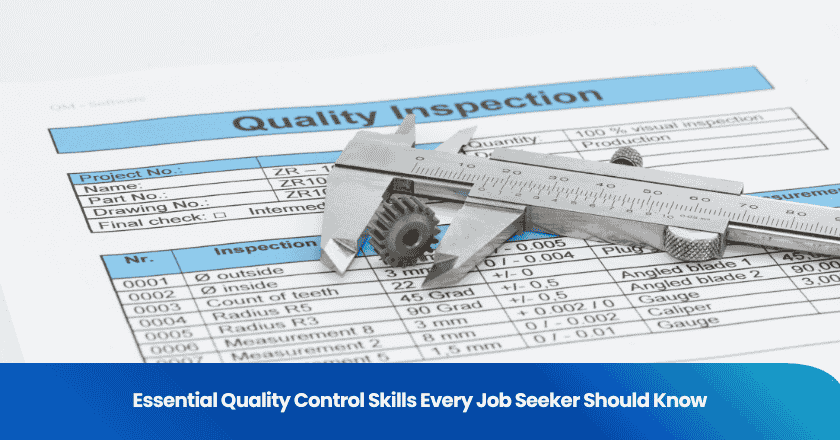
Success in quality control roles starts with mastering quality control skills such as attention to detail, analytical thinking, communication, and problem-solving. You rely on these abilities to spot errors, analyze data, and maintain high standards. To gauge your current level, consider using standardized assessments that evaluate complexity, fairness, and inclusivity.
The table below highlights key considerations for effective skill assessment:
| Key Considerations for Skill Assessment | Description |
|---|---|
| Complexity of Skills | Assess the difficulty level of the skills being evaluated. |
| Time Constraints | Consider the time available for assessments. |
| Candidate Experience | Ensure the assessment is accessible to all candidates. |
| Fairness and Inclusivity | Use standardized criteria to minimize bias. |
| Integration with HR Systems | Ensure the assessment can be integrated with existing systems. |
| Regular Review and Validation | Continuously update assessment methods to reflect industry standards. |
Take time to reflect on your strengths and areas for growth. Regular self-assessment helps you stay ready for new opportunities in quality control.
Key Takeaways
- Master key quality control skills like attention to detail, analytical thinking, communication, and problem-solving to excel in your role.
- Regular self-assessment helps identify strengths and areas for growth, keeping you prepared for new opportunities in quality control.
- Utilize standardized assessments to evaluate your skills fairly and inclusively, ensuring you meet industry standards.
- Stay updated with the latest technologies and tools in quality control to enhance your efficiency and effectiveness.
- Continuously improve your skills through workshops, online courses, and hands-on training to remain competitive in the job market.
Quality control skills overview
Quality control roles demand a blend of hard and soft skills. You need to master both technical expertise and interpersonal abilities to excel in these positions.
The table below outlines the core skill types recognized by industry standards and professional organizations:
| Skill Type | Skills |
|---|---|
| Hard Skills | Understanding technical aspects, familiarity with industry guidelines (ISO, GMP), accurate measurement, good record-keeping, certifications (ASQ) |
| Soft Skills | Attention to detail, clear communication, problem-solving, adaptability, teamwork |
Attention to detail
You play a crucial role in maintaining product standards by focusing on every aspect of the process. Attention to detail helps you identify defects and inconsistencies, which reduces the likelihood of errors. When you pay close attention, you can:
- Ensure products meet specific standards.
- Spot issues early and rectify them before they escalate.
- Enhance overall quality by preventing mistakes from reaching customers.
This skill allows you to catch small problems before they become major setbacks. Your commitment to detail supports a reliable and efficient process.
Analytical thinking
Analytical thinking drives improvements in quality control environments. You use this skill to interpret data, evaluate trends, and make informed decisions.
Strong analytical thinking leads to measurable outcomes such as:
| Measurable Outcome | Description |
|---|---|
| Operational Efficiency | Significant improvements in operational efficiency and market position. |
| Product Quality Improvements | Reduced defect rates and increased consistency in outputs, leading to higher first-pass yield. |
| Customer Satisfaction | Higher customer retention rates and increased referral business due to consistent product quality. |
| Cost Reduction | Significant cost savings through reduced waste, rework, and improved resource utilization. |
| Brand Value Enhancement | Strengthened brand reputation leading to premium pricing and competitive advantages. |
| Regulatory Compliance Benefits | Maintained compliance with industry regulations, reducing audit findings and penalties. |
You analyze data from each process step, identify patterns, and recommend changes that boost efficiency and quality.
Communication
Effective communication strengthens collaboration within quality control teams. You share insights, align goals, and promote accountability. Key benefits of strong communication include:
- Fostering open dialogue and aligning team objectives.
- Facilitating cross-functional collaboration to identify risks early.
- Enhancing real-time discussions during audits and walkthroughs.
- Defining clear quality standards to avoid discrepancies.
- Encouraging accountability and mutual respect among team members.
- Addressing potential risks before they escalate.
Your ability to communicate clearly ensures everyone understands the process and works toward common goals.
Problem-solving
Problem-solving is essential for overcoming challenges in quality control. You use proven techniques to reduce defect rates and improve the process. Common approaches include:
- Employee Training: You help workers understand quality standards, leading to early defect identification.
- Root Cause Analysis: You identify underlying issues and implement corrective measures to prevent recurrence.
- Preventive Maintenance: You maintain equipment to avoid breakdowns and ensure consistent product quality.
- Six Sigma: You apply data-driven methods to reduce defects and improve efficiency.
You address issues quickly and effectively, ensuring the process remains smooth and reliable.
Tip: Industry benchmarks for proficiency in quality control skills include regulatory knowledge, testing proficiency, auditing skills, CAPA management, risk management, inspection readiness, data integrity, and continuous improvement. You can use these benchmarks to assess your strengths and target areas for growth.
Technical and inspector skills
Quality control inspector skills form the backbone of effective quality management in any industry. You need to master a range of technical abilities and tools to ensure every process meets strict standards. Modern manufacturing relies on advanced systems and continuous improvement, making these skills essential for your success.
Measurement abilities
You must develop strong measurement abilities to excel as a quality control inspector. These skills allow you to evaluate products accurately and maintain consistency throughout the process. You will use visual inspection, measurement tools, functional testing, and destructive testing to assess product quality. Companies often assess your abilities through practical skills assessments, where you identify defects in real-world scenarios, and knowledge-based tests that evaluate your understanding of inspection methods. Mastering these techniques ensures you can detect issues early and keep the process running smoothly.
Technological aptitude
Technological aptitude sets you apart in quality control inspector skills. You will work with advanced tools such as automated weighing machines, precise measuring instruments, and computerized maintenance management systems.
The table below highlights how technology impacts your effectiveness:
| Evidence Type | Description |
|---|---|
| Technological Tools | Automated inspection systems and digital devices improve monitoring quality. |
| Efficiency Improvement | Familiarity with technology increases efficiency in every process. |
| Industry Trends | Staying updated with new technologies keeps you aligned with industry needs. |
You should stay current with the latest digital tools and software to optimize your workflow and adapt to evolving industry standards.
Data analysis
Data analysis is a core part of quality control inspector skills. You will use data to monitor trends, identify problems, and improve the process. Common methods include histograms, Pareto charts, scatter diagrams, stratification techniques, control charts, and check sheets. These tools help you break down complex data, spot patterns, and make informed decisions. By mastering data analysis, you ensure that every process step meets quality requirements and supports continuous improvement.
Quality control inspector skills
To succeed, you must develop a unique set of quality control inspector skills. These include attention to detail, technical proficiency, problem-solving abilities, and effective communication. You will also need physical stamina to handle tasks that require standing or lifting. The following list summarizes the most important skills and tools you should focus on:
- Quality Management Systems
- Statistical Process Control
- Automated Inspection Systems
- Data analysis and process optimization
- Digital tool expertise and device programming
- Safety awareness and machine operations
You can build these skills through hands-on training, online courses, and regular practice. Focus on continuous improvement to stay competitive and ensure every process delivers high-quality results.
Analyst and decision-making skills
Quality control analyst
You play a vital role in maintaining high standards throughout every process. As a quality control analyst, you conduct inspections, tests, and evaluations to ensure products and services meet strict requirements. You analyze data to identify trends and patterns, which helps you spot potential issues before they affect outcomes. You develop and maintain protocols that guide your team through each process step. Collaboration with cross-functional teams allows you to resolve quality issues and implement corrective actions. You prepare detailed reports that document your findings and support continuous improvement. Staying current with industry trends keeps your quality control skills sharp and relevant.
Decision-making
You make decisions that directly impact product quality and process efficiency. As a quality control analyst, you use data-driven approaches to evaluate options and select the best course of action. You rely on root cause analysis to identify underlying problems and prevent recurrence. Your decisions influence how quickly your team responds to challenges and adapts to changes. You must balance speed and accuracy, ensuring every process meets regulatory and safety standards.
Tip: Use root cause analysis to guide your decision-making. This method helps you address problems at their source and supports long-term improvements.
Research skills
You need strong research skills to excel as a quality control analyst. You apply statistical analysis to identify quality problems and recommend solutions. Analytical methods help you validate new techniques and maintain consistency during product packaging. You use Laboratory Information Management Systems (LIMS) to provide data for investigations and audits. CAPA (Corrective and Preventive Action) supports compliance and helps you address quality issues effectively.
Leadership
You influence quality outcomes and team performance through effective leadership. As a quality control analyst, you set clear standards and drive a culture of excellence. You communicate the importance of quality, empower your team, and allocate resources to support every process. You monitor key performance indicators, encourage continuous improvement, and resolve challenges proactively. You align quality control with strategic goals, positioning your team for success.
1. Setting clear quality standards
2. Driving a culture of quality
3. Ensuring effective communication
4. Empowering teams
5. Allocating resources
6. Monitoring and measuring quality
7. Supporting continuous improvement
8. Leading by example
9. Resolving quality issues
10. Aligning QC with strategic goals
Showcasing skills on your resume
Resume tips
You need to present your resume in a way that immediately captures attention. Career experts recommend several strategies for candidates seeking quality control positions:
1. Align your resume with the job description by using specific employer requirements and phrases.
2. Use a reverse chronological format to emphasize your most recent experience.
3. Keep your resume to one page if you have less than ten years of experience; two pages are acceptable for more experienced professionals if the content is relevant.
4. Include work experience from the last ten to fifteen years, summarizing or omitting older roles unless they add significant value.
5. Attach a tailored cover letter with each resume submission, highlighting your most impressive credentials.
6. List relevant skills in both the skills section and the experience section to provide context.
7. Utilize strong action verbs to make your resume dynamic and engaging.
When you focus on resume skills for junior quality control inspectors, emphasize foundational abilities such as attention to detail and basic measurement techniques. For resume skills for mid-level quality control inspectors, highlight your experience with data analysis and process optimization. If you are targeting resume skills for senior quality control inspectors, showcase leadership, strategic decision-making, and advanced technical expertise.
Demonstrating skills
During interviews and practical assessments, you can demonstrate your quality control skills by discussing your experiences with quality issues. Describe how you led investigations into out-of-specification results and implemented corrective actions. Collaborate with production or R&D teams to resolve quality issues, showing your communication skills and teamwork. Adhere to safety standards by following protocols and participating in safety trainings. Use statistical tools for data analysis, such as control charts and Pareto charts, to monitor quality trends and support decision-making. Highlighting quality control inspector skills in these ways helps you stand out.
Continuous improvement
Continuous improvement remains essential for your career growth.
The following table outlines best practices for developing your skills:
| Strategy | Description | Application Areas |
|---|---|---|
| Total Quality Management (TQM) | Involves all employees in maintaining high standards and enhancing customer satisfaction. | Manufacturing, healthcare, services |
| PDCA Cycle | A four-step model for continuous improvement: Plan, Do, Check, Act. | New projects, process refinement, data-driven improvements |
| Root Cause Analysis (RCA) | Identifies and eliminates underlying causes of issues to prevent recurrence. | Process efficiency, customer satisfaction, performance |
| Benchmarking | Compares processes against industry leaders to identify performance gaps. | Measure and Analyze phases of DMAIC |
| 5S Methodology | Focuses on workplace organization and safety through five steps. | Manufacturing, service industries |
| Value Stream Mapping (VSM) | Analyzes the flow of materials and information to improve efficiency. | Define and Measure phases of DMAIC |
You should regularly update your resume to reflect new achievements and skills. This approach demonstrates your commitment to growth and positions you for advancement in quality control roles.
Mastering quality control skills positions you as a standout candidate in today’s competitive job market. You build expertise through continuous learning, certification, and networking. Focus on teamwork, problem-solving, and analytical skills to advance your career.
Stay ahead by attending workshops, setting career goals, and leveraging technology such as AI for data analysis and research.
FAQ
What are the most important quality control skills for beginners?
You need to focus on attention to detail, basic measurement techniques, and clear communication. These skills help you identify defects, follow procedures, and work well with your team.
How can you improve your quality control skills?
You can attend workshops, complete online courses, and practice with real-world scenarios. Regular self-assessment and feedback from supervisors help you track progress and target areas for growth.
Do you need certifications for quality control jobs?
Certifications such as ASQ or ISO training boost your credibility. Many employers prefer candidates with formal training, but you can start with hands-on experience and pursue certifications as you advance.
What tools do quality control inspectors use?
You use calipers, micrometers, automated inspection systems, and data analysis software. These tools help you measure products, monitor processes, and ensure compliance with industry standards.
How do you show quality control skills during an interview?
You describe situations where you solved problems, led investigations, or improved processes. Use specific examples and explain your approach to teamwork, data analysis, and continuous improvement.
Grow your business with TradeAider Service
Click the button below to directly enter the TradeAider Service System. The simple steps from booking and payment to receiving reports are easy to operate.





